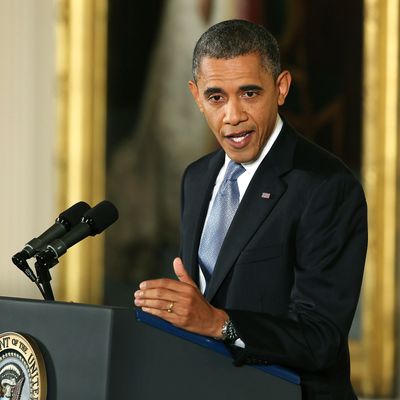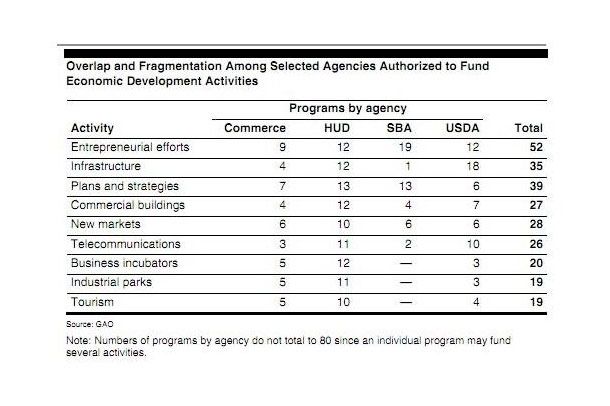
If you can remember as far back as the 2012 presidential race, you may remember that, shortly before the election, President Obama floated the idea of creating a new Cabinet-level position called the “secretary of Business.” This person, Obama said, would oversee an agency that combined the functions of a number of smaller business-related agencies into a single “one-stop shop” for commercial concerns.
Few ideas have landed with such a thud. Mitt Romney’s campaign quickly took advantage of the layup opportunity (“We don’t need a secretary of business to understand business. We need a president who understands business”), and nobody on the president’s team rushed to defend it. Now, a month after the election, the idea of a consolidated Department of Business seems to have died a quiet, ignominious death.
Why?
Let’s look at the actual proposal President Obama made last January, when the idea of a consolidated agency first came up:
Right now, there are six departments and agencies focused primarily on business and trade in the federal government … In this case, six is not better than one. Sometimes more is better; this is not one of those cases, because it produces redundancy and inefficiency. With the authority that I’m requesting today, we could consolidate them all into one department, with one website, one phone number, one mission: helping American businesses succeed.
The agencies the president proposed consolidating were the Small Business Administration, the Office of the U.S. Trade Representative, the Export-Import Bank, the Overseas Private Investment Corporation, and the Trade and Development Agency. (Later, during the campaign, he expanded this list to nine. He did not, to my knowledge, specify which additional three agencies would be included in the consolidation, but they may include things like the Federal Trade Commission. It is possible, but much less likely, that the combined agency would take in regulatory agencies like the CFTC or the CFPB.)
President Obama’s original rationale for the Department of Business was that by consolidating smaller agencies into one mega-agency, you could reduce the number of employees required to run it by 1,000 and save an estimated $3 billion over the next decade. And while $3 billion is chump change compared to the entire federal budget, it’s not nothing.
You would think, absent any other information, that Republicans would love any chance to reduce the size and expense of government while at the same time giving businesses an easier way to make their concerns heard. And the six (nine?) agencies the president mentioned combining do indeed have a lot of overlap. This chart from a 2011 GAO report shows just some of the many functions that could be combined for savings:

So, why was the secretary of Business idea such a dud?
Romney’s swift dismissal of Obama’s idea (“I don’t think adding a new chair in his cabinet will help add millions of jobs on Main Street”) didn’t really contain any substantive criticisms. But here are a few reasons I’ve gotten from political watchers for opposing the idea, along with my gentle challenges to those ideas:
1. Having a secretary of Business would hurt small businesses.
This concern was immediately floated by small-business lobbyists, who worried that if you lumped all businesses together for the purposes of policy-making and oversight, some of their concerns would get lost in the shuffle. “The things a large business needs from the government are very different from what small businesses need from the government,” Todd McCracken, the president of the National Small Business Association, told me this morning. “As it stands, it’s very difficult for small businesses to get the attention of even the Department of Commerce. And it could get harder.”
That’s a decent reason to oppose a giant catch-all agency, but it’s not clear that a Department of Business would actually make it harder for small businesses to make their views heard. In fact, depending on its structure, a unified department could make it easier by giving them a single place to send their lobbyists, instead of having them fanned out across a half-dozen different agencies. And in theory, there could be a designated under-secretary of Small Business, for example, who could be their point person and report directly to the Cabinet member.
2. The Department of Business would become a giant subsidy-printing machine for big corporations and/or businesses like Solyndra.
This fear was elucidated to me by several business leaders and think-tank fellows. The idea, basically, is that having a bunch of overlapping, not-very-powerful agencies all overseeing business and trade in the U.S. is actually a good thing, since it prevents any one person or body from “picking winners and losers,” as Mark Calabria of the Cato Institute put it to me. Calabria asked, “By creating a secretary of Business, are you simply creating an ombudsman for companies to lobby for more protection and benefits?”
Again, a lot would depend on the structure of the Department of Business and who was appointed to run it. But you could easily make the case that concentrating the lobbying and favor-seeking efforts of big corporations under a single roof could make them easier for the general public to spot and oppose. It’s easier for watchdogs to patrol one agency than nine, and if something went wrong, à la Solyndra, it would be easier to haul one person in front of Congress to explain the situation than hear from a parade of smaller, largely ineffectual agency heads.
3. A Department of Business would never get through Congress.
This is, in my opinion, the primary reason the idea of a secretary of Business hasn’t caught on among right-leaning types and pragmatists on the left. To create a new Cabinet-level post, President Obama would need statutory authority, and that means wrangling Congress into agreement. Most people agree that doing so would require a tremendous amount of political capital that the Obama administration would rather use elsewhere (like the deficit negotiations).
“It would mean, probably, reconfiguring jurisdictions of committees, and that’s always a challenge,” Calabria told me.
But this kind of thing has been done as recently as 2001, when President Bush used an executive order to consolidate 22 (22!) different government agencies into the newly created Office of Homeland Security and then got the votes to turn it into the full-fledged department we have today. Doing that took a bit of wrangling and arm-twisting, and it deprived some agencies and committees of their power. But it got done, in large part because legislators on both sides of the aisle recognized that the country needed to do something to coordinate a fast response to the attacks of 9/11 without going through internecine haggling and miles of red tape.
We have a similar problem with commerce and trade policy today — so why not try a similar technique?
4. You could appoint the wrong person.
This one is stickier because it divides more along partisan lines. Conservatives generally think that, if given the chance to appoint a secretary of Business, President Obama would pick a leftist intellectual like Elizabeth Warren or someone like Valerie Jarrett, who “knows nothing about business or the economy,” as the WSJ op-ed page claimed back in October. And Democrats fear that if a Republican president were elected, he or she would appoint a major CEO who would use the post to push for massive deregulation and subsidies for big business.
Until we get more details from the Obama administration about what a Department of Business would look like or how it would function, it’s hard to know whether it would help or hinder the economic recovery, or whether it could ever get the kind of bipartisan support that the DHS did.
But it’s worth looking into, if only because the mess of small, cloistered agencies we have now makes implementing any kind of broad commerce policy a labyrinthine nightmare. And as the country continues to pull its way out of an unemployment crisis and help kick-start economic growth, a unified response might be just what we need.





























